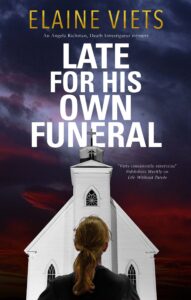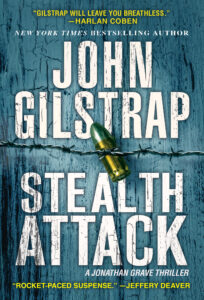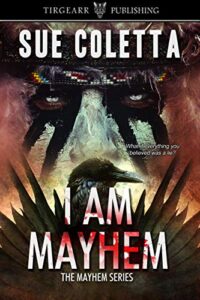by James Scott Bell
@jamesscottbell
I’ve had to take care of some life matters this week, so I’m going to re-post a little “test” I once posted. Time to play again!
Below is a bit of writing I made up based on errors I see all the time in manuscripts and published (even traditionally!) books. Heck, I’ve been guilty at one time or another, especially in my early years. Some of these are technically not “errors,” as they may be grammatically correct. But they’re what I call “little writing speed bumps.” They disturb the reader’s fictive dream, usually in a subconscious way. The more bumps, the less enjoyable the reading experience.
Learn to spot them in your own writing, however, and you can smooth out the road.
So here we go. Read the following and jot down all the speed bumps you can find. Don’t look ahead to the answer sheet yet. You’re on the honor system!
John Harper gazed out the window at his Christmas present.
He gazed at a beautiful boat.
“How do you like it?” his wife said. Carol was dressed in a red sweater.
Carol luxuriated in the softness of the sweater. Her smile was soft and warm.
John turned from the window and embraced his wife.
“I can see you do,” Carol laughed.
Kissing Carol full on the mouth, John whispered, “I like you even more.”
Carol Harper was forty-two. A graduate of Bryn Mawr, she had studied folklore and mythology, before finally deciding to major in business. Her first job out of college was with an advertising firm in New York.
“I like you too,” Carol said lovingly.
“I like you so much,” John repeated, “that I want to take you out to a nice dinner tonight.”
“A nice dinner, John?” Carol expostulated. “Tonight?”
“Yes,” John winked. “Tonight.”
How’d you do, class? Now, take this quiz home to your parents and return it with a note saying they’ve seen it …
… or not. Below is the excerpt with my answers provided. Some of them have footnotes that you can read below the excerpt. Have a look, then open up a discussion in the comments.
John Harper gazed out the window at his Christmas present.
He gazed [ECHO. SEE NOTE 1, BELOW] at a beautiful boat.
“How do you like it?” his wife said. Carol was dressed in a red sweater. [POV PROBLEM. WE’RE IN JOHN’S HEAD. HOW CAN HE SEE HIS WIFE’S OUTFIT IF HE’S LOOKING OUT THE WINDOW?]
Carol luxuriated [POV SWITCH TO CAROL] in the softness of the sweater. Her smile was soft [ECHO] and warm. [POV PROBLEM. WHO SEES THIS? NOT HER. SHE’S NOT LOOKING IN A MIRROR, AND NOT JOHN, WHO IS LOOKING OUT THE WINDOW]
John turned from the window and embraced his wife.
“I can see you do,” [HOW? HE’S EMBRACING HER] Carol laughed [YOU DON’T LAUGH DIALOGUE. SEE NOTE 2]
Kissing Carol full on the mouth, John whispered [HOW CAN JOHN WHISPER ANYTHING IF HE’S FULL ON THE MOUTH? SEE NOTE 3], “I like you even more.”
Carol Harper was forty-two. [POV SWITCH. THIS IS AN OMNISCIENT VIEW]. A graduate of Bryn Mawr, she had studied folklore and mythology, [MISPLACED COMMA] before finally deciding to major in business. Her first job out of college was with an advertising firm in New York. [ALL THIS IS INFO DUMP AND EXPOSITION. IT CAN WAIT!]
“I like you too,” Carol said lovingly. [ADVERB IS unnecessary. SEE NOTE 4]
“I like you so much [ECHO IN DIALOGUE],” John repeated [REDUNDANT], “that I want to take you out to a nice dinner tonight.”
“A nice dinner, John?” [UNNECESSARY USE OF NAME. SEE NOTE 5] Carol expostulated [I HOPE I DON’T HAVE TO EXPLAIN THIS. BUT SEE NOTE 2 AGAIN]. “Tonight?”
“Yes, [UNNECCESARY FILLER. SEE NOTE 6]” John winked [DIALOGUE DOESN’T WINK!]. “Tonight.” [ECHO]
[FINAL AND MOST IMPORTANT COMMENT: NO CONFLICT OR TENSION ANYWHERE! SEE NOTE 7]
NOTES:
- An echo is when a descriptive word (an adjective or verb) is used more than once in close proximity. Here, gazed is used in back-to-back sentences. It’s not “wrong” to do this, but it’s a bump in the reader’s mind.
- For attributions in dialogue, use said as your default. Its job is to clue the reader in on who is speaking and nothing more. It’s virtually invisible. If you are tempted to use another word to indicate a manner of speaking, look to the context and seek to make things clear. For example: Sgt. Trask clenched his teeth. “Fall in!” he growled. We know he growled from the context and the exclamation point. We know he is speaking, too. So: Sgt. Trask clenched his teeth. “Fall in!” is enough.
- This kind of sentence construction is called a participle phrase. It begins with a word ending in –ing. What you have to watch out for are two actions that defy the laws of physics. In other words, can the two actions take place at the same time? Full-on kissing and whispering cannot (unless you speak fluent French. Ahem). But these two actions can coexist: Getting out of his car, John heard a woman scream. While some writing instructors hold that you should never use a participle phrase. I think they’re just fine if they a) pass the coexistence test; and b) are used sparingly.
- Adverbs propping up dialogue attributions are almost always unnecessary. If it’s not clear how something is being said from the dialogue itself, or the action surrounding it, see if you can make it clear. The occasional adverb is fine, but only if you truly need it.
- Avoid having characters tell each other things they both already know. The other character’s name is one of these. Unless, of course, the character is trying to be adamant, as in, “John, how many times do I have to tell you not to kidnap the neighbors!” But when you try to slip in exposition in dialogue, it can sound truly phony if it’s information both characters already possess: “Oh hello Arthur, my family doctor from Baltimore. Please come in.”
- One of the best ways to make dialogue crisp is to cut needless filler words. Look for these at the start of dialogue, especially Yes, No, and Well. The sentence in the piece would have been much better this way: John winked. “Tonight.” (Why is tonight not an echo? Because John is using it as an echo. It’s intentional.)
- The scene is dullsville because there’s no conflict. There should be some tension, any kind, even if it’s only an emotional knot inside one of the characters. Anything that takes the scene south of normal.
John Harper gazed out the window at his Christmas present.
“How do you like it?” his wife said.
John turned from the window and faced Carol.
“I can see you do,” Carol said.
“What’s wrong with your eyesight?” John said.
So what about you? Did you see anything else? What conflict might be added to improve the scene?




 By Elaine Viets
By Elaine Viets Murder seems to touch us all. When I thought about it, I realized I’d watched a murderer grow up in my city neighborhood. We lived on a shady street with big, old redbrick houses. One house, halfway down the block, was known as “the trouble house.” The police were there two or three times a week. The neighbors often called the cops on the boy, who I’ll call Billy, because that’s not his name. Billy broke windows, supposedly stole things out of yards, and may have tortured a stray cat.
Murder seems to touch us all. When I thought about it, I realized I’d watched a murderer grow up in my city neighborhood. We lived on a shady street with big, old redbrick houses. One house, halfway down the block, was known as “the trouble house.” The police were there two or three times a week. The neighbors often called the cops on the boy, who I’ll call Billy, because that’s not his name. Billy broke windows, supposedly stole things out of yards, and may have tortured a stray cat. In 2020, some 17,754 people were murdered in the USA. More than 40 people are murdered every day in the US. That statistic led to a jury room full of raised hands, and lives filled with sorrow and regret.
In 2020, some 17,754 people were murdered in the USA. More than 40 people are murdered every day in the US. That statistic led to a jury room full of raised hands, and lives filled with sorrow and regret. Late for His Own Funeral “ is a fascinating exploration of sex workers, high society, and the ways in which they feed off of one another.” — Kings River Life. Buy it here:
Late for His Own Funeral “ is a fascinating exploration of sex workers, high society, and the ways in which they feed off of one another.” — Kings River Life. Buy it here: Stealth Attack hit the stands in July, 2020, which means I wrote it in 2019. When I read the email, I was confused. I couldn’t remember anything in that book that resembled anything that Mary Anne found so offensive. Recognizing that I am getting no younger, and that my memory isn’t necessarily as acute as it used to be, I pulled the book from my shelf and re-read Chapter 17.
Stealth Attack hit the stands in July, 2020, which means I wrote it in 2019. When I read the email, I was confused. I couldn’t remember anything in that book that resembled anything that Mary Anne found so offensive. Recognizing that I am getting no younger, and that my memory isn’t necessarily as acute as it used to be, I pulled the book from my shelf and re-read Chapter 17.

 As I tell this story, think back over your life. We’ve all gone through hard times, some worse than others. Humor me, and if you’re struggling with story structure, you’ll at least begin to grasp it by the time you’ve read this post. That’s my hope, anyway.
As I tell this story, think back over your life. We’ve all gone through hard times, some worse than others. Humor me, and if you’re struggling with story structure, you’ll at least begin to grasp it by the time you’ve read this post. That’s my hope, anyway.


 In the good old days of carousels, there was a little item called the brass ring. According to
In the good old days of carousels, there was a little item called the brass ring. According to 
